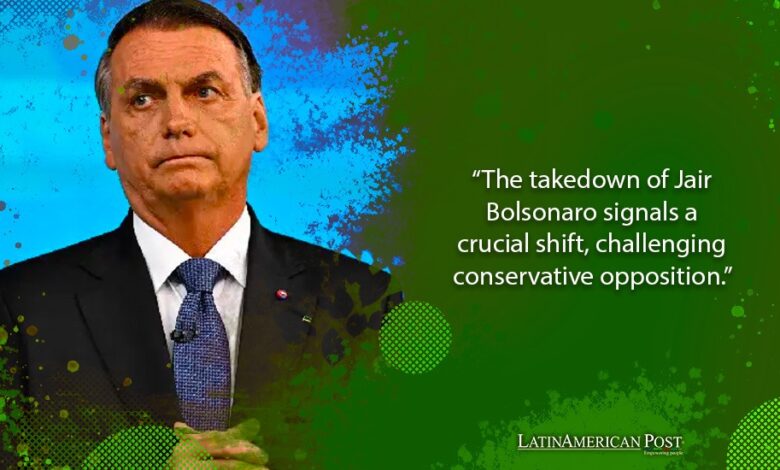Bolsonaro’s Fall is a Blow to Brazil’s Conservative Opposition

In Brazil, the takedown of Jair Bolsonaro signals a crucial shift, challenging conservative opposition, as authorities’ decisive moves put the former president and his allies on the defensive.
Brazil’s recent crackdown on former President Jair Bolsonaro and his associates is a political earthquake that could drastically weaken the country’s conservative opposition. By confiscating Bolsonaro’s passport and implicating him in severe allegations of subverting democracy, Brazilian authorities have not only curbed the political prowess of a critical right-wing figure but have also set a precedent that could deter future extremist agendas. This operation’s impact on Brazil’s conservative movement could be monumental, signaling a newfound resilience in Brazilian democracy and building robust barriers against authoritarian resurgence.
Cautious Sigh of Relief for Brazilian Democracy
Brazilian democracy breathes a cautious sigh of relief as the unruly elements within its political landscape finally encounter the uncompromising arm of the law. The recent operation that saw former President Jair Bolsonaro’s passport confiscated and accusations of his direct involvement in an attempted coup present a pivotal moment for the nation. This action represents more than a temporary inconvenience for Bolsonaro; it underscores a decisive severing of the momentum right-wing extremists have gathered in recent years.
The revelation that Bolsonaro sought to harness military might to clamp down on Supreme Court justices and forcibly engineer a fresh election represents an assault on the very foundations of democratic governance. It is an admission, through deed, that the electoral will of the populace is deemed secondary to the whims of the political elite. Brazil’s conservative opposition, which has enjoyed significant clout under Bolsonaro’s reign, now faces a daunting future. The undeniable brush of autocracy has tarnished the ethos of democratic righteousness.
With their figurehead ensnared in allegations that strike at the core of democratic tenets, Brazil’s conservative bloc must now distance itself from the specter of authoritarianism or risk alienation from the electorate. The stain of attempted subversion can alienate crucial moderate supporters and bolster the arguments of leftist counterparts, granting them the moral high ground and the opportunity to lay claim to the protectorate of Brazil’s democratic integrity. This situation is further exacerbated by the capitulation of Bolsonaro’s inner circle – the arrest of former aides and warrants issued against ex-ministers paint a picture of a faction in disarray.
Moreover, the visible enforcement of accountability upon political personas of such high stature is a precursor for potential rogue elements within the opposition. Fear of similar repercussions could deter undercurrents of sedition, effectively disarming the most militant factions within the conservative spectrum. Consequently, this may prompt a recalibration towards more moderate and democratically palatable conservative platforms, enhancing the prospects for legitimate and healthy political competition.
Symbolism in Detainment: Bolsonaro’s Passport Saga
The detainment of Bolsonaro’s passport is symbolic. It not only restricts his physical movement but also signals an emblematic restriction on the subversive ideologies he represents. A federal police source’s implication that passport seizures may precede arrests is a stark indication of the seriousness of the situation. If Bolsonaro were to be arrested, the repercussions could resonate through Brazil’s right wing, instilling a sense of vulnerability that could impair any unrestrained populist maneuvering.
The implications for Bolsonaro’s international standing are profound as well. Often compared to former U.S. President Donald Trump for his populist approach and incendiary rhetoric, Bolsonaro’s predicament may act as a deterrent to similarly minded leaders globally. International observers, who have feared the spread of populist and authoritarian ideologies, may find solace in Bolsonaro’s decline, taking it as a sign that resilient, democratic institutions can indeed stem the tide of political extremism.
Also read: High-Interest Rates Reveal Latin America’s Leftist Policies Vulnerabilities
Conclusion: Brazil’s Stride Towards Democratic Stability
In conclusion, the tightening of the legal noose around Jair Bolsonaro and his affiliates not only hinders a once-formidable political adversary but also evokes a broader impact on Brazil’s conservative opposition. The pathways of extremism have been blocked, encouraging a more centrist approach and bolstering the resilience of Brazilian democracy. While the immediate future may be fraught with political repositioning and legal battles, the long-term outcome could be a more balanced and sturdy political landscape. As a result, Brazil takes a definitive stride away from the brink of political degradation and towards the reassuring ground of democratic stability.





